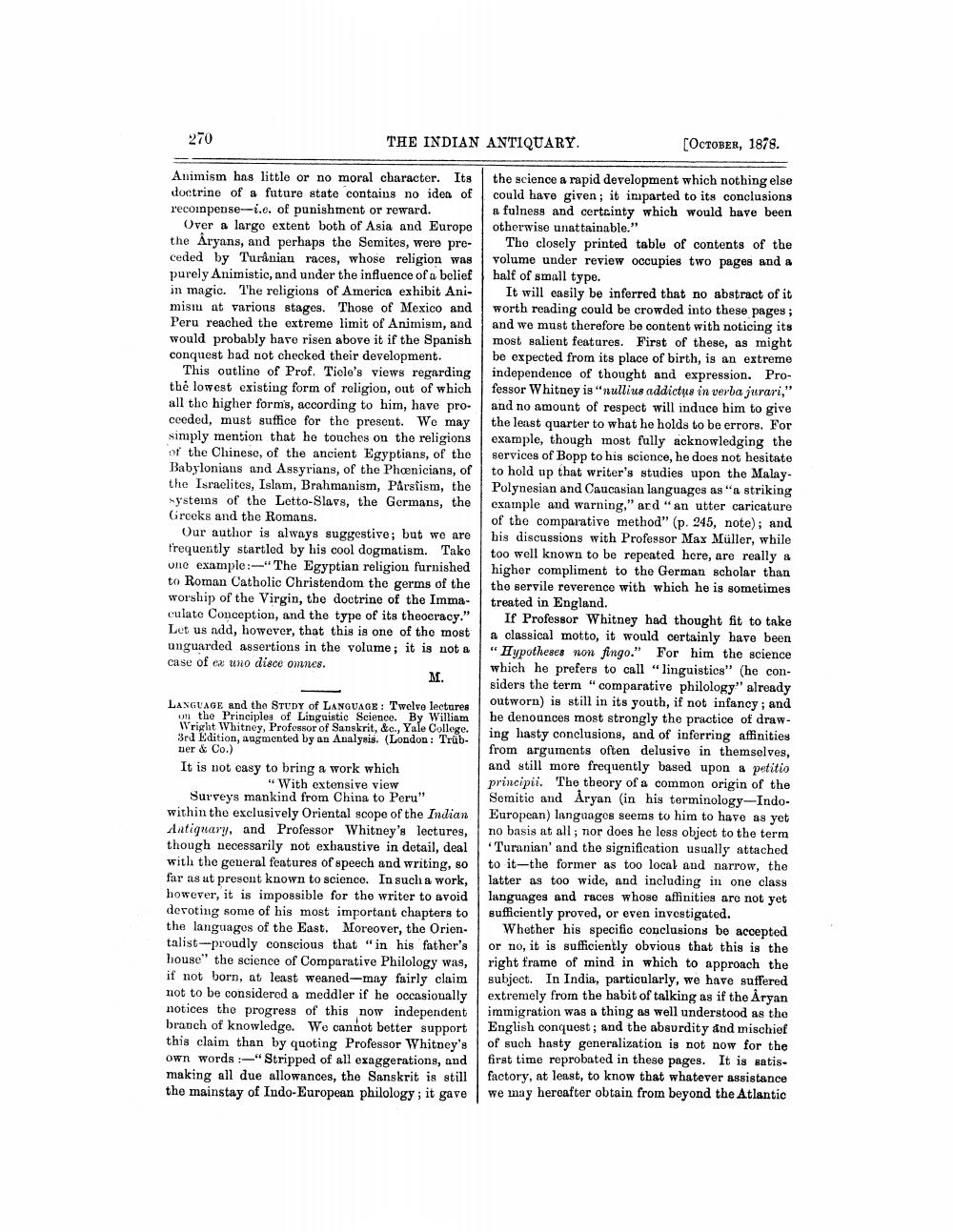________________
270
THE INDIAN ANTIQUARY.
[OCTOBER, 1878.
-
Animism has little or no moral character. Its the science a rapid development which nothing else doctrine of a future state contains no idea of could have given; it imparted to its conclusions recoinpense-i.c. of punishment or reward. a fulness and certainty which would have been
Over a largo extent both of Asia and Europe otherwise unattainable." the Aryans, and perhaps the Semites, were pre- Tho closely printed tablu of contents of the ceded by Turânian races, whose religion was volume under review occupies two pages and a purely Animistic, and under the influence of a belief half of small type. in magic. The religions of America exhibit Ani- It will easily be inferred that no abstract of it mismı at varions stages. Those of Mexico and worth reading could be crowded into these pages; Peru reached the extreme limit of Animism, and and we must therefore be content with noticing its would probably have risen above it if the Spanish most salient features. First of these, as might conquest had not checked their development. be expected from its place of birth, is an extreme
This outline of Prof. Tiole's views regarding independence of thought and expression. Prothe lowest existing form of religion, out of which fessor Whitney is "nullius addictus in verba jurari," all the higher forms, according to him, have pro- and no amount of respect will induce him to give ceeded, must suffice for the present. We may the least quarter to what he holds to be errors. For simply mention that he touches on the religions example, though most fully acknowledging the of the Chinese, of the ancient Egyptians, of the services of Bopp to his science, he does not hesitate Babylonians and Assyrians, of the Phænicians, of to hold up that writer's studies upon the Malay. the Israelites, Islam, Brahmanism, Pärsfism, the Polynesian and Caucasian languages as "a striking
ystems of the Letto-Slavs, the Germans, the example and warning," ard "an utter caricature Greeks and the Romans.
of the comparative method" (p. 245, note); and Our author is always suggestive; but we are his discussions with Professor Max Müller, while frequently startled by his cool dogmatism. Take too well known to be repeated here, are really & one example:-"The Egyptian religion furnished
higher compliment to the German scholar than to Roman Catholic Christendom the germs of the the servile reverence with which he is sometimes worship of the Virgin, the doctrine of the Imma- treated in England. culate Conception, and the type of its theocracy." If Professor Whitney had thought fit to take Let us ndd, however, that this is one of the most a classical motto, it would certainly have been unguarded assertions in the volume; it is not a "Hypotheses non fingo." For him the science case of ex uno disce omnes.
which he prefers to call "linguistics" (he conM.
siders the term "comparative philology" already LANGUAGE and the STUDY of LANGUAGE: Twelve lectures
outworn) is still in its youth, if not infancy; and on the Principles of Linguistic Science. By William he denounces most strongly the practice of drawWright Whitney, Professor of Sanskrit, &c., Yale College.
ing hasty conclusions, and of inferring affinities 3rd Edition, augmented by an Analysis. (London: Trubner & Co.)
from arguments often delusive in themselves, It is not easy to bring a work which
and still more frequently based upon a petitio "With extensive view
principii. The theory of a common origin of the Surveys mankind from China to Peru"
Somitio and Aryan (in his terminology-Indowithin the exclusively Oriental scope of the Indian European) languages seems to him to have as yet Antiquary, and Professor Whitney's lectures, no basis at all; nor does he less object to the term though necessarily not exhaustive in detail, deal | Turanian' and the signification usually attached with the general features of speech and writing, soto it-the former as too local and narrow, the far as ut present known to science. In such a work, latter as too wide, and including in one class however, it is impossible for the writer to avoid languages and races whose affinities are not yet devoting some of his most important chapters to sufficiently proved, or even investigated. the languages of the East. Moreover, the Orien. Whether his specific conclusions be accepted talist---proudly conscious that "in his father's or no, it is sufficiently obvious that this is the house" the science of Comparative Philology was, right frame of mind in which to approach the if not born, at least weaned-may fairly claim subject. In India, particularly, we have suffered not to be considered a meddler if he occasionally extremely from the habit of talking as if the Aryan notices the progress of this now independent immigration was a thing as well understood as the branch of knowledge. We cannot better support | English conquest; and the absurdity and mischief this claim than by quoting Professor Whitney's of such hosty generalization is not now for the own words :-"Stripped of all exaggerations, and first time reprobated in these pages. It is satismaking all due allowances, the Sanskrit is still factory, at least, to know that whatever assistance the mainstay of Indo-European philology; it gave we may hercafter obtain from beyond the Atlantic




